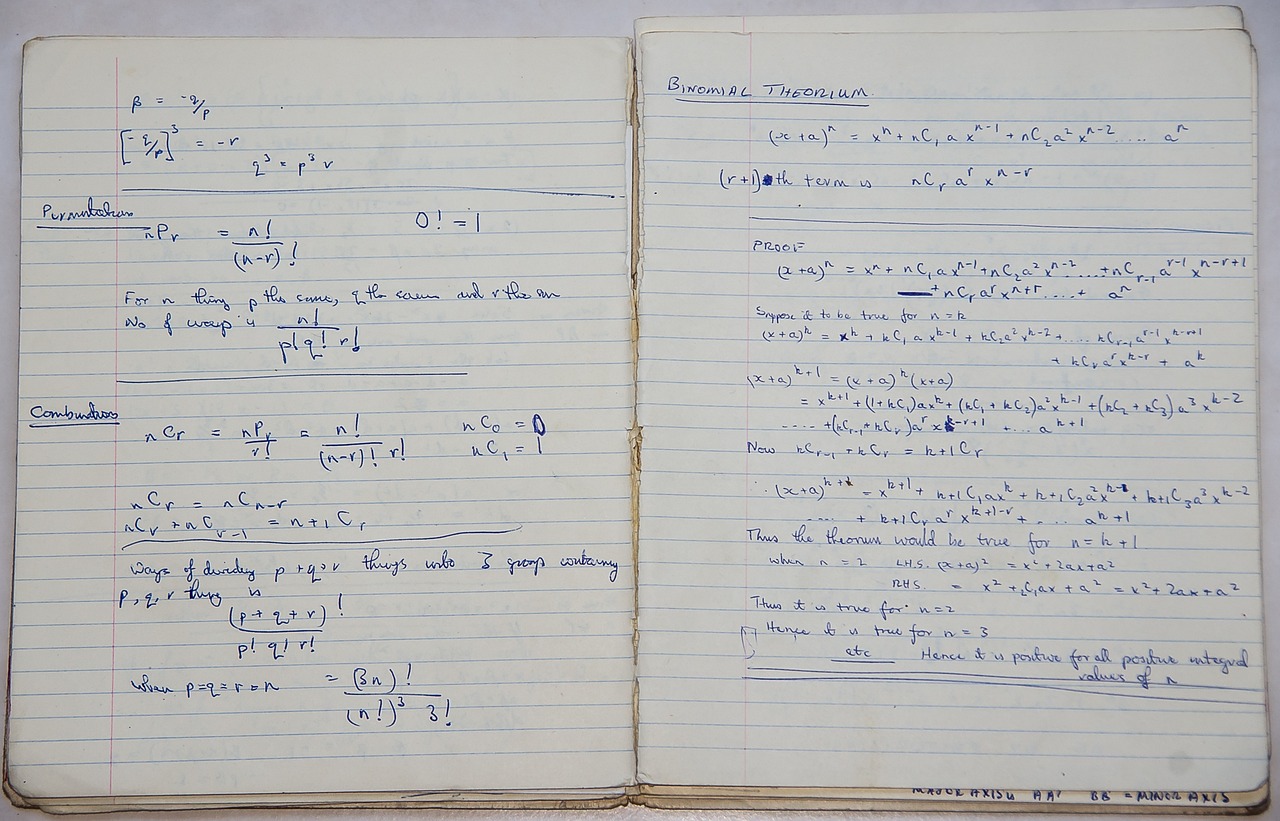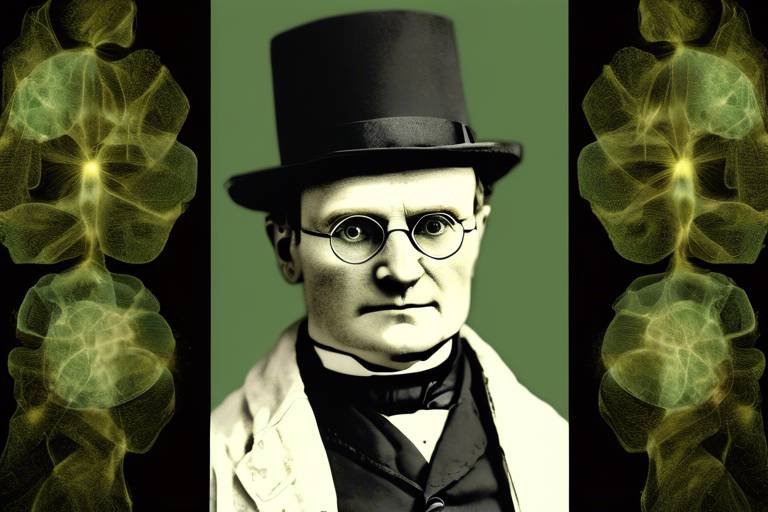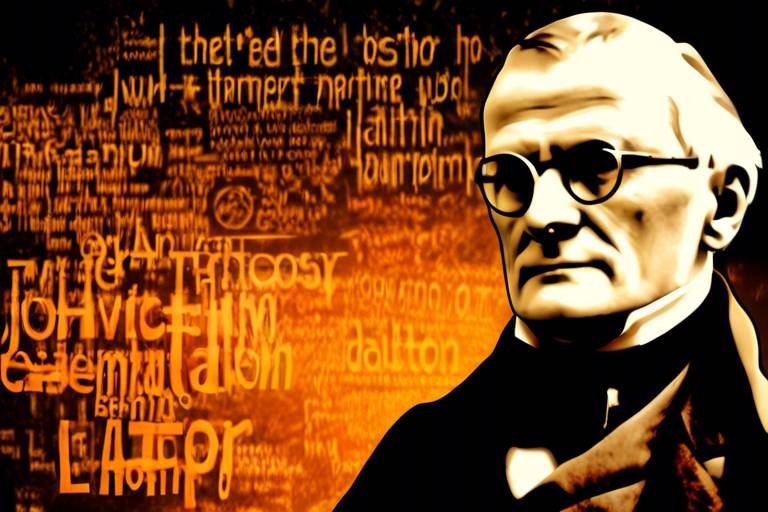Emmy Noether - The Mathematician Who Revolutionized Physics
Emmy Noether was not just a mathematician; she was a trailblazer who shattered the glass ceiling in a field dominated by men. Born in 1882 in Erlangen, Germany, she emerged as one of the most influential figures in mathematics and theoretical physics. Her journey was not merely about numbers and equations; it was about breaking barriers and redefining the very foundations of science. As we dive into her life and contributions, we uncover the essence of her legacy—one that continues to inspire generations of scientists and mathematicians.
Noether's work transcended traditional boundaries, connecting seemingly unrelated concepts across mathematics and physics. Imagine a world where the laws of the universe are intertwined with abstract algebra; that's precisely what Noether achieved. Her groundbreaking ideas didn't just enhance our understanding of mathematics; they provided a robust framework for theoretical physics, leading to revolutionary advancements in various scientific domains. In this article, we will explore her early life, her remarkable contributions, the challenges she faced, and the enduring legacy she left behind.
Emmy Noether was born into a family that valued education, which undoubtedly played a significant role in shaping her future. Growing up in the late 19th century, she faced numerous challenges as a woman aspiring to enter the academic world. At a time when women were often discouraged from pursuing higher education, Noether defied societal norms. She enrolled at the University of Erlangen, where she initially studied mathematics and later earned her doctorate in 1907. Despite her brilliance, she encountered resistance from male colleagues who doubted her capabilities simply because of her gender.
Noether's contributions to mathematics are nothing short of phenomenal. Her work in abstract algebra and ring theory laid the groundwork for many modern mathematical concepts. She introduced innovative ideas that transformed the way mathematicians think about structures and relationships within mathematics. For instance, her exploration of ideal theory opened new avenues for research and paved the way for future developments in algebra.
One of her most celebrated contributions is Noether's Theorem, which elegantly connects symmetries and conservation laws in physics. In simple terms, it states that every differentiable symmetry of the action of a physical system corresponds to a conservation law. This theorem is a cornerstone of modern theoretical physics, influencing everything from classical mechanics to quantum field theory. Imagine being able to predict the behavior of particles based on the symmetries of their governing equations; that's the power of Noether's insights.
Noether's Theorem has transformed our understanding of physics, particularly in areas such as quantum mechanics and relativity. Her work laid the foundation for physicists like Albert Einstein and Richard Feynman, who built upon her ideas to develop theories that changed our understanding of the universe. It's fascinating to think that a mathematician's work could influence the very fabric of reality as we know it.
Today, the applications of Noether's Theorem extend to various scientific domains, including particle physics and cosmology. For instance, in the realm of particle physics, her theorem helps explain the conservation of energy and momentum during particle interactions. In cosmology, it aids in understanding the symmetry properties of the universe. Researchers continue to rely on her insights, proving that her work is as relevant today as it was in the early 20th century.
Despite her brilliance, Noether faced significant challenges due to her gender. In a male-dominated academic environment, she often had to fight for recognition and respect. The discrimination she encountered was not just a personal battle; it was a reflection of the broader societal attitudes towards women in science. Yet, Noether persevered, driven by her passion for mathematics and her unwavering belief in her abilities. Her resilience serves as an inspiring reminder that talent knows no gender.
Emmy Noether's legacy continues to inspire mathematicians and physicists today. Her contributions are not merely historical footnotes; they are integral to the ongoing discourse in mathematics and science. Posthumously, she has received numerous accolades and recognitions, including memorials and awards named in her honor. These honors serve not only to celebrate her achievements but also to remind us of the importance of diversity and inclusion in the scientific community.
Noether's groundbreaking work has paved the way for many mathematicians, particularly women in STEM. She has become a symbol of empowerment for aspiring female scientists, showing them that they too can achieve greatness in a field that has historically sidelined them. Her influence is evident in the careers of countless mathematicians and physicists who cite her as a source of inspiration.
In recognition of her contributions, Noether has been honored with various awards and memorials. Some of these include:
- The Noether Lecture, established to honor outstanding women in mathematics.
- The Emmy Noether Institute for Mathematics in Germany.
- A dedicated section in the International Mathematical Union's awards.
These accolades not only celebrate her remarkable achievements but also highlight the ongoing need for recognition of women in science.
Q1: What is Noether's Theorem?
A1: Noether's Theorem connects symmetries in physics to conservation laws, stating that every differentiable symmetry corresponds to a conservation law.
Q2: How did Emmy Noether contribute to modern mathematics?
A2: Noether's work in abstract algebra and ring theory laid the groundwork for many contemporary mathematical concepts and theories.
Q3: What challenges did Noether face in her career?
A3: Noether faced discrimination and skepticism due to her gender, which made it difficult for her to gain recognition in a male-dominated field.
Q4: Why is Noether's legacy important today?
A4: Noether's legacy is vital as it continues to inspire future generations of mathematicians and scientists, particularly women in STEM fields.

Early Life and Education
Emmy Noether was born on March 23, 1882, in the quaint city of Erlangen, Germany. Growing up in a family steeped in academia, her father, Max Noether, was a well-respected mathematician, which undoubtedly influenced her early fascination with numbers and equations. Despite the supportive environment, Emmy's journey was far from smooth, especially considering the societal norms of her time that often sidelined women in the fields of science and mathematics.
As a young girl, Noether exhibited remarkable intelligence and a keen interest in mathematics. However, her aspirations were often met with skepticism. In a world where women were expected to pursue more traditional roles, she faced numerous challenges in her quest for higher education. Yet, her determination shone through. At a time when few women were allowed to attend university, she managed to enroll at the University of Erlangen in 1900, where she studied mathematics. This was a significant achievement, as it was uncommon for women to pursue advanced studies in a male-dominated discipline.
Throughout her academic journey, Noether faced various obstacles, including the lack of acceptance from her male peers and professors. Despite these challenges, she persevered, earning her doctorate in 1907. Her dissertation, which focused on algebraic invariants, showcased her exceptional talent and laid the groundwork for her future contributions to mathematics. She was not just another student; she was a trailblazer, challenging the status quo and proving that women could excel in fields traditionally reserved for men.
After completing her doctorate, Noether continued her academic career, albeit in a limited capacity. Initially, she worked without pay and was often relegated to teaching roles that did not reflect her capabilities. However, her brilliance could not be contained. She began to attract attention for her innovative ideas and approaches to mathematics, eventually gaining the respect of her peers. It was during this period that she developed her groundbreaking theories, which would later revolutionize the fields of mathematics and physics.
In summary, Emmy Noether's early life and education were marked by both adversity and triumph. Her relentless pursuit of knowledge in the face of societal barriers not only shaped her career but also paved the way for future generations of women in STEM. Her story serves as a powerful reminder of the importance of resilience and determination in the pursuit of one's passions.

Mathematical Contributions
Emmy Noether's contributions to mathematics are nothing short of revolutionary. Her work in abstract algebra and ring theory has laid the groundwork for many modern mathematical concepts that we take for granted today. Imagine a world where the very fabric of mathematics is woven together by her theories; that’s the legacy she left behind. Noether’s ability to think outside the box and challenge the norms of her time allowed her to make connections that others simply could not see.
One of her most significant achievements is the development of Noetherian rings, which are foundational in the field of commutative algebra. These rings are crucial for understanding the structure of algebraic objects and have applications in various branches of mathematics, including algebraic geometry and number theory. To put it simply, Noether's work provided a new lens through which mathematicians could view and solve problems, much like how a telescope enhances our ability to see distant stars.
Another critical area of Noether's contributions is her work on group theory. She explored the relationships between algebraic structures and their symmetries, which has profound implications in both mathematics and physics. Noether's insights into how groups operate paved the way for future researchers to delve deeper into the connections between algebra and geometry. Her work essentially created a bridge between these two fields, enabling mathematicians to traverse complex landscapes of thought with greater ease.
To illustrate her impact, consider the following table that summarizes some of her major contributions:
| Contribution | Field | Significance |
|---|---|---|
| Noetherian Rings | Abstract Algebra | Foundation for modern algebraic structures |
| Noether's Theorem | Theoretical Physics | Connects symmetries with conservation laws |
| Group Theory Insights | Mathematics | Bridged algebra and geometry |
The significance of Noether's work cannot be overstated. Her theories have not only influenced mathematics but have also permeated the realms of theoretical physics. For instance, her theorem is now a cornerstone in the understanding of conservation laws, illustrating how mathematical principles can describe physical phenomena. This interconnection between abstract thought and tangible reality is what makes Noether's contributions so extraordinary.
As we look at the landscape of modern mathematics, it is clear that Noether's influence is woven into the very fabric of the discipline. Her ability to challenge conventions and push boundaries continues to inspire mathematicians around the globe. Without her groundbreaking insights, many areas of mathematics might have developed very differently, or perhaps not at all. In a world that often overlooks the contributions of women, Noether stands out as a beacon of brilliance, demonstrating that passion and intellect can indeed change the world.
- What is Noether's Theorem?
Noether's Theorem states that every differentiable symmetry of the action of a physical system has a corresponding conservation law. This profound connection has deep implications in physics, particularly in fields like quantum mechanics.
- Why is Emmy Noether important in mathematics?
Emmy Noether is considered one of the most important mathematicians of the 20th century due to her pioneering work in abstract algebra and her revolutionary contributions to theoretical physics.
- How did Noether overcome challenges in her career?
Noether faced significant gender discrimination throughout her career but persevered through her exceptional talent, determination, and the support of her peers and mentors.

Noether's Theorem
Noether's Theorem is often described as one of the most profound results in theoretical physics and mathematics, and for good reason. Formulated by Emmy Noether in 1915, this theorem establishes a deep and elegant connection between symmetries and conservation laws in physics. Imagine you're at a party, and every time you hear a certain song, people start dancing. The music (the symmetry) leads to a specific behavior (the conservation of energy in dance moves). In the same way, Noether's Theorem reveals that for every symmetry in a physical system, there is a corresponding conservation law that governs the behavior of that system.
At its core, Noether's Theorem states that if a physical system exhibits a certain symmetry, then there is a corresponding quantity that remains constant over time. For example, consider the symmetry of time: if the laws of physics are the same today as they were yesterday, then energy is conserved. This insight has major implications in various fields, including classical mechanics, quantum mechanics, and even general relativity. To illustrate this, let's take a look at some of the key symmetries and their associated conservation laws:
| Symmetry | Conservation Law |
|---|---|
| Time Translation Symmetry | Conservation of Energy |
| Spatial Translation Symmetry | Conservation of Momentum |
| Rotational Symmetry | Conservation of Angular Momentum |
This table highlights just a few examples of how Noether's Theorem applies across various physical contexts. The implications of her work extend beyond theoretical musings; they have shaped our understanding of the universe. For instance, in quantum field theory, Noether's Theorem plays a crucial role in the formulation of the Standard Model of particle physics, which describes the fundamental forces and particles in the universe.
Moreover, Noether's Theorem is not just a theoretical construct; it has practical applications in modern physics. In fields such as cosmology, physicists utilize the theorem to explore the behavior of the universe at large scales, while in particle physics, it helps in understanding interactions at the subatomic level. This theorem has become a cornerstone of modern physics, making Noether's contributions invaluable to our scientific heritage.
In summary, Noether's Theorem is not merely an abstract mathematical idea; it is a fundamental principle that links the symmetries of nature to the laws that govern it. Emmy Noether's work has provided us with a powerful framework for understanding the universe, and her legacy continues to resonate in both mathematics and physics today.
- What is Noether's Theorem? Noether's Theorem connects symmetries in physical systems to conservation laws, revealing that every symmetry corresponds to a conserved quantity.
- Why is Noether's Theorem important? It has profound implications for physics, helping to explain fundamental concepts in areas like quantum mechanics and relativity.
- How does Noether's Theorem apply in modern science? It is used in various fields, including particle physics and cosmology, to understand interactions and the behavior of the universe.

Impact on Theoretical Physics
Emmy Noether's contributions to theoretical physics are nothing short of revolutionary. Her most celebrated achievement, Noether's Theorem, elegantly links symmetries in physical systems to conservation laws, fundamentally altering our understanding of the universe. Imagine trying to solve a complex puzzle; Noether provided the key pieces that allowed physicists to see the bigger picture. Before her work, the relationship between symmetry and conservation was largely intuitive. Noether made it rigorous, establishing a formal framework that has become indispensable in modern physics.
To put it simply, Noether's Theorem asserts that for every continuous symmetry of a physical system, there exists a corresponding conservation law. For example, the symmetry of time in physics—where the laws of physics remain unchanged over time—leads to the conservation of energy. This connection is not just theoretical; it has profound implications across various fields. Below are some areas where Noether's influence is particularly evident:
- Quantum Mechanics: In quantum mechanics, Noether's Theorem provides insights into the conservation of probability and the behavior of quantum states.
- General Relativity: The theorem plays a vital role in understanding the conservation of momentum and energy in curved spacetime.
- Particle Physics: It helps explain the conservation laws that govern particle interactions, which are foundational for the Standard Model of particle physics.
Furthermore, many of the leading physicists of the 20th century, including Albert Einstein and Richard Feynman, acknowledged the profound impact of Noether's work. Einstein himself utilized her concepts in his formulations of general relativity. The mathematical elegance of Noether's contributions has not only shaped theoretical physics but has also provided a toolkit for physicists to explore new realms of science.
In contemporary research, Noether's Theorem continues to inspire new theories and experiments. Scientists investigating dark matter and dark energy often reference her work as they seek to understand the universe's mysteries. The theorem has become a cornerstone of theoretical physics, guiding researchers in their quest to uncover the fundamental laws that govern everything from the tiniest particles to the vast cosmos.
In summary, the impact of Emmy Noether on theoretical physics is immense and enduring. Her ability to connect abstract mathematical concepts with physical reality has opened doors to new fields of inquiry and has forever changed the landscape of science. As we continue to explore the universe, Noether's legacy serves as a reminder of the power of mathematics in unlocking the secrets of nature.

Applications in Modern Science
Emmy Noether's revolutionary ideas have not only shaped the foundations of mathematics but also permeated various branches of modern science. One of the most striking applications of Noether's Theorem is in the realm of particle physics. This field, which studies the fundamental constituents of matter, relies heavily on the symmetries that Noether articulated. For instance, the conservation of energy and momentum—two principles that govern particle interactions—are direct outcomes of the symmetries Noether identified. It's almost like discovering the rules of a game that were always there but never fully understood!
In addition to particle physics, Noether's work has profound implications in cosmology, the study of the universe's origin and evolution. The symmetries described in her theorem help physicists understand the conservation laws that govern the universe's expansion and the behavior of cosmic structures. Imagine trying to navigate through a complex maze. Without understanding the underlying pathways (or symmetries), you might just wander aimlessly. Noether's insights provide that essential map for scientists exploring the universe.
Moreover, Noether's contributions extend into the cutting-edge field of quantum mechanics. In this domain, her theorem assists in explaining the behavior of particles at the quantum level, where traditional physics often falters. The interplay of symmetries and conservation laws allows physicists to make predictions about particle behavior, leading to groundbreaking discoveries in the realm of quantum computing and quantum field theory. It's as if Noether handed scientists a toolkit filled with precise instruments to unlock the mysteries of the quantum world!
To illustrate the diverse applications of Noether's Theorem in modern science, consider the following table:
| Field of Study | Application of Noether's Theorem |
|---|---|
| Particle Physics | Conservation of energy and momentum in particle interactions |
| Cosmology | Understanding the symmetries in the universe's expansion |
| Quantum Mechanics | Predicting particle behavior and advancements in quantum technologies |
These applications underscore how Noether's work transcends mathematics, influencing various scientific domains and enhancing our understanding of the universe. Her legacy is a testament to the power of abstract thought and its ability to illuminate even the most complex phenomena in our world.
- What is Noether's Theorem? Noether's Theorem establishes a profound connection between symmetries and conservation laws in physics, showing that for every symmetry, there is a corresponding conservation law.
- How has Noether's work influenced modern physics? Her work has provided a framework for understanding fundamental principles in various fields, including particle physics, cosmology, and quantum mechanics.
- Why is Emmy Noether considered a pioneer for women in science? Despite facing significant challenges due to her gender, Noether's groundbreaking contributions have inspired countless women to pursue careers in mathematics and physics.

Challenges and Discrimination
Despite her extraordinary talent and groundbreaking contributions to mathematics and physics, Emmy Noether faced significant challenges throughout her career, primarily due to the gender biases prevalent in her time. Born in 1882, Noether entered a field that was overwhelmingly dominated by men. Imagine being a pioneer in a world that often questioned your very right to participate! This was the reality for Noether, who had to navigate a landscape filled with skepticism and discrimination.
In Germany, during the late 19th and early 20th centuries, women were often discouraged from pursuing higher education, especially in the sciences. Noether's determination to study mathematics led her to attend the University of Erlangen, where she initially faced resistance. She was often relegated to the role of an observer in academic discussions, and her contributions went unnoticed. It’s akin to being a brilliant musician stuck in a room full of deaf listeners—your talent is there, but few are willing to acknowledge it.
As she progressed in her studies, Noether's perseverance began to pay off. However, she still encountered numerous hurdles. For instance, she was often denied formal teaching positions and had to rely on the goodwill of her male colleagues to secure her place in the academic community. In 1915, when she was finally allowed to lecture, it was without pay, which reflected the systemic bias against women in academia. The irony of her situation is striking: here was a woman whose work would later be deemed revolutionary, yet she was often treated as a second-class citizen in her own field.
Despite these challenges, Noether remained undeterred. She continued to produce groundbreaking work, but her journey was not without its emotional toll. The constant battle against discrimination took its toll on her mental health. Noether's story is a reminder of the resilience required to break through societal barriers. It serves as a powerful example for anyone facing similar obstacles today. The struggles she endured were not just personal but representative of a larger fight for equality in academia and beyond.
In her later years, particularly during her time in the United States after fleeing Nazi Germany, Noether experienced a different kind of discrimination. While she was welcomed by some, she also faced xenophobia and the challenges of being an immigrant in a foreign land. Yet, she continued to teach and inspire the next generation of mathematicians and physicists, proving that her spirit could not be dimmed by prejudice.
Ultimately, Noether's legacy is not just in her mathematical theories but in her ability to challenge the status quo. She paved the way for future generations of women in STEM, showing them that with determination and brilliance, they could overcome even the most daunting barriers. Her story is a testament to the idea that while discrimination may slow you down, it cannot stop you if you are committed to your cause.
- What were the major challenges Emmy Noether faced in her career?
Noether faced significant gender discrimination, lack of recognition, and financial instability in a male-dominated academic environment. - How did Noether's work influence modern physics?
Noether's Theorem established a profound connection between symmetries and conservation laws, impacting fields like quantum mechanics and relativity. - What legacy did Emmy Noether leave behind?
Noether's legacy includes inspiring future generations of mathematicians and physicists, particularly women pursuing careers in STEM.

Legacy and Recognition
Emmy Noether's legacy is nothing short of extraordinary. Though she faced numerous challenges in her lifetime, her contributions to mathematics and physics have left an indelible mark on the scientific community. Noether's work has not only influenced her contemporaries but has also paved the way for future generations of mathematicians and physicists. Today, she is celebrated as a pioneer, particularly for women in STEM fields, who continue to draw inspiration from her tenacity and brilliance.
One of the most significant aspects of Noether's legacy is her ability to challenge the status quo. At a time when women were often discouraged from pursuing careers in science, Noether broke barriers and opened doors for others. Her story serves as a powerful reminder that perseverance can lead to groundbreaking achievements, even in the face of adversity. As we look at the trajectory of her influence, it’s clear that her work has become a cornerstone of modern mathematics and theoretical physics.
In recognition of her contributions, various institutions and organizations have honored Noether's memory through awards, lectures, and memorials. For instance, the Noether Lecture is an annual event held in her honor, celebrating women in mathematics. Additionally, her name has been attached to several mathematical concepts and theorems, ensuring that her legacy will endure for generations to come.
| Year | Award/Recognition | Description |
|---|---|---|
| 1935 | Honorary Doctorate | Received from the University of Göttingen for her contributions to mathematics. |
| 1975 | Noether Memorial Lecture | Established to honor her legacy and promote women in mathematics. |
| 2018 | Google Doodle | Featured on International Women’s Day to celebrate her achievements. |
Noether's influence extends beyond her immediate contributions; she has inspired countless mathematicians and physicists to explore new frontiers in their fields. Her work in abstract algebra and theoretical physics has become foundational, and many of her ideas are now integral to modern research. This is especially true in areas like quantum mechanics and relativity, where her insights into symmetries and conservation laws have proven essential.
Furthermore, her legacy is particularly impactful for women pursuing careers in science. By breaking through the barriers of her time, Noether has become a role model for many aspiring female scientists. Her life story encourages women to pursue their passions, reminding them that their contributions can be just as significant as their male counterparts.
In summary, Emmy Noether's legacy is characterized by her groundbreaking work, her role as a trailblazer for women in science, and her lasting impact on mathematics and physics. The recognitions she has received, both during her lifetime and posthumously, serve not only to honor her contributions but also to inspire future generations to continue her work in exploring the mysteries of the universe.
- What is Emmy Noether best known for?
Noether is best known for her groundbreaking contributions to abstract algebra and her theorem connecting symmetries and conservation laws in physics. - How did Noether overcome the challenges she faced as a woman in mathematics?
Despite facing significant gender discrimination, Noether persisted in her academic career by focusing on her research and earning respect from her peers. - What is Noether's Theorem?
Noether's Theorem establishes a profound connection between symmetries in physical systems and conservation laws, revolutionizing the field of theoretical physics.

Influence on Future Mathematicians
Emmy Noether's legacy is a vibrant tapestry woven into the fabric of mathematics and physics, inspiring countless individuals to pursue their passions in these fields. Her groundbreaking contributions, particularly in abstract algebra and theoretical physics, have not only laid the groundwork for modern mathematical concepts but have also opened doors for future generations of mathematicians, especially women. Imagine a world where young girls, once discouraged from pursuing science and math, now look to Noether as a beacon of hope and possibility. This shift in perspective is a testament to her enduring influence.
Noether's journey through a male-dominated academic landscape serves as a powerful narrative that resonates with many aspiring mathematicians. She faced numerous obstacles, but her perseverance and brilliance shone through, proving that talent knows no gender. This has encouraged many women to break barriers in STEM fields, fostering a culture of inclusion and empowerment. Today, we see a growing number of female mathematicians and physicists who credit Noether as a source of inspiration in their own journeys.
Moreover, Noether's work has become a fundamental part of the curriculum in mathematics and physics courses worldwide. Many educational institutions include her theories and contributions in their syllabi, ensuring that her legacy lives on in classrooms across the globe. By learning about her achievements, students not only gain insight into complex mathematical concepts but also understand the importance of diversity in scientific inquiry.
To illustrate her impact, consider the following:
| Field | Influence |
|---|---|
| Abstract Algebra | Her work has paved the way for modern algebraic structures, influencing both theoretical and applied mathematics. |
| Theoretical Physics | Noether's Theorem has become a cornerstone in understanding symmetries in physics, impacting major theories like quantum mechanics. |
| Women in STEM | Her perseverance encourages women to pursue careers in mathematics and physics, fostering a more inclusive environment. |
In addition to her academic influence, Noether's story has inspired numerous biographies, documentaries, and even academic conferences dedicated to her life and work. These platforms not only celebrate her achievements but also encourage discussions about gender equality and representation in science. As we continue to honor her legacy, it becomes increasingly important to advocate for equitable opportunities in mathematics and physics, ensuring that future generations can thrive in an environment that values diversity and innovation.
In conclusion, Emmy Noether's influence on future mathematicians is profound and multifaceted. She is not just a figure of the past; she is a guiding light for those who aspire to make their mark in mathematics and science. Her story serves as a reminder that with determination, intellect, and passion, anyone can challenge the status quo and achieve greatness, regardless of the obstacles they may face.
- Who was Emmy Noether? Emmy Noether was a German mathematician known for her groundbreaking work in abstract algebra and theoretical physics, particularly for Noether's Theorem.
- What is Noether's Theorem? Noether's Theorem establishes a fundamental connection between symmetries and conservation laws in physics, revolutionizing our understanding of these concepts.
- How did Noether influence women in mathematics? Noether's achievements in a male-dominated field serve as an inspiration for many women, encouraging them to pursue careers in STEM and break down barriers.
- What is Noether's legacy today? Noether's work continues to be taught in educational institutions worldwide, and her story inspires discussions about diversity and inclusion in the sciences.

Honors and Awards
Emmy Noether's extraordinary contributions to mathematics and physics did not go unnoticed, even during her lifetime. While she faced numerous challenges and discrimination as a woman in a predominantly male field, her brilliance shone through, earning her a place among the greats of science. After her passing in 1935, her legacy continued to grow, leading to numerous honors and awards that recognize her groundbreaking work.
One of the most significant recognitions came in the form of the Noether Lecture, established in her honor by the American Mathematical Society. This prestigious lecture series aims to showcase the work of women mathematicians, ensuring that Noether's legacy inspires future generations. The Noether Lecture is held annually, featuring distinguished speakers who discuss topics in mathematics, emphasizing the contributions of women in the field.
In addition to the Noether Lecture, various institutions and organizations have established awards named after her. For instance, the Emmy Noether Prize is awarded by the Association for Women in Mathematics to recognize outstanding research in mathematics by women. This award not only honors Noether's contributions but also encourages and supports women pursuing careers in mathematics, paving the way for a more inclusive future.
Furthermore, Noether's influence extends beyond awards; her name has been immortalized in various academic settings. Numerous universities have created scholarships and fellowships in her name, aimed at supporting female students in mathematics and physics. These initiatives serve as a testament to her enduring impact and the recognition of the barriers she overcame.
To summarize, while Emmy Noether faced significant challenges throughout her career, her remarkable contributions have led to a wealth of honors and awards that celebrate her legacy. From the Noether Lecture to various prizes and scholarships, her influence continues to inspire countless individuals in the fields of mathematics and physics.
- What is Noether's Theorem? Noether's Theorem establishes a profound connection between symmetries and conservation laws in physics.
- Why is Emmy Noether significant? She revolutionized mathematics and theoretical physics, making foundational contributions that continue to influence modern science.
- What challenges did Noether face? As a woman in a male-dominated field, she encountered discrimination and barriers to her academic career.
- Are there any awards named after Noether? Yes, there are several awards and lectures established in her honor, including the Noether Lecture and the Emmy Noether Prize.
Frequently Asked Questions
-
Who was Emmy Noether?
Emmy Noether was a pioneering mathematician born in 1882 in Erlangen, Germany. She made significant contributions to abstract algebra and theoretical physics, earning her the title of one of the most important mathematicians of the 20th century. Her work laid the groundwork for many modern mathematical concepts and theories.
-
What is Noether's Theorem?
Noether's Theorem is a groundbreaking principle that connects symmetries in physical systems to conservation laws. Essentially, it states that for every symmetry, there is a corresponding conservation law, which has profound implications in physics, especially in fields like quantum mechanics and relativity.
-
How did Noether's work impact modern physics?
Noether's contributions transformed our understanding of fundamental physics. Her theorem has been instrumental in the development of various theories, influencing renowned physicists and shaping areas such as particle physics and cosmology. It's like finding a hidden key that unlocks the door to deeper scientific understanding!
-
What challenges did Emmy Noether face during her career?
Despite her brilliance, Noether faced significant challenges due to her gender in a male-dominated field. She encountered discrimination and was often overlooked for academic positions and recognition. However, her perseverance and dedication to her work allowed her to overcome these obstacles and leave a lasting legacy.
-
What is Noether's legacy today?
Noether's legacy continues to inspire mathematicians and physicists around the world. Her groundbreaking work has paved the way for future generations, particularly women in STEM fields. Today, she is celebrated not only for her mathematical contributions but also for her role as a trailblazer for women in science.
-
Has Emmy Noether received any awards or honors?
Yes, Emmy Noether has been posthumously recognized with various awards and memorials that celebrate her contributions to mathematics and physics. These honors serve as a testament to her impact on the scientific community and highlight the importance of recognizing the contributions of women in science.



















